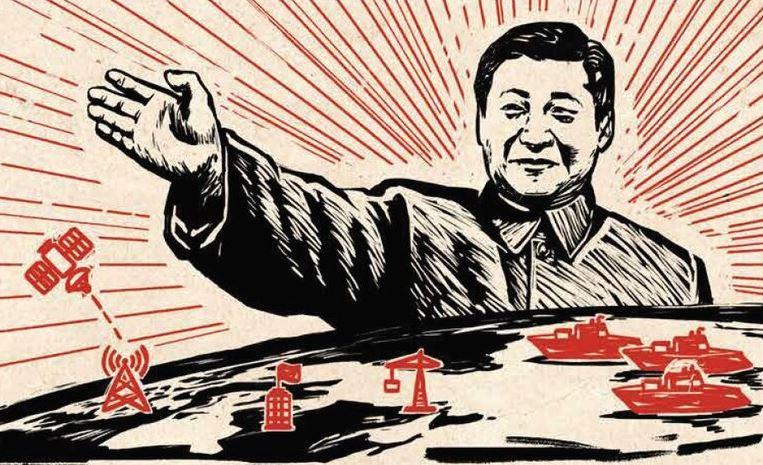From the bookshelf: ‘The long game: China’s grand strategy to displace American order’
Posted By Robert Wihtol on October 13, 2021 @ 11:00

Does China intend to displace the United States as the world’s leading superpower? Henry Kissinger [1] has frequently argued that China approaches foreign relations from a long-term perspective, while Western countries are tactical, focusing on short-term gain. China is playing wei qi (better known as go), where the aim is to encircle your adversary, while the rest of the world is playing chess, where you aim to topple the other player.
In The long game [2], Rush Doshi takes this argument a step further, postulating that dating back to the 1980s, China has been pursuing a grand strategy to displace the American-led global order. China plans to achieve this by 2049, the centenary of the People’s Republic. Doshi, the newly appointed China director in the Biden administration’s National Security Council, maps out how the strategy has unfolded in three distinct phases.
During the ‘Hiding capabilities and biding time’ stage (1989–2008), China focused on blunting the role of the US and other Western countries. With scarce resources, China’s approach was asymmetric. For example, it invested heavily in submarines, missiles and mines, all relatively low-cost means of limiting access to waters controlled by China.
Emboldened by the global financial crisis, which highlighted the weakness of the US, China shifted to the building stage (2009–2016), expanding its political clout, strengthening its navy and setting up its own regional and global institutions, including the Shanghai Cooperation Organisation, the Asian Infrastructure Investment Bank and the Belt and Road Initiative.
Following Xi Jinping’s confirmation for a second term as general secretary of the Chinese Communist Party in 2017, China shifted into high gear, assertively expanding its global reach.
Doshi’s greatest strength lies in his detailed analysis of recent changes in China’s political, economic and military relations. He has built an extensive database of Chinese sources ranging from official policy pronouncements and speeches to think-tank and press commentary. This allows him to document nuanced policy shifts in areas ranging from military procurement to China’s establishment of its own credit rating agencies.
The book brims with insider details. When the People’s Liberation Army in the late 1990s decided to build its own aircraft carriers, it recruited a flamboyant Chinese tycoon to negotiate the purchase of an incomplete Ukrainian aircraft carrier under the guise of turning it into a floating casino. Without arousing too much suspicion, the middleman managed to include the original blueprints and engines in the deal. The blueprints were essential to help China build its own aircraft carriers, and the engines were more advanced than anything China could produce.
The book also details the negotiations for the establishment of the AIIB, which attracted much controversy. Once Western countries started to join, membership snowballed, catching China by surprise.
Doshi makes a powerful case that China is pursuing a grand strategy to replace the US as world leader. However, he shows occasional signs of confirmation bias, with disparate policies fitting together as grand strategy just a bit too neatly. One wonders whether some military procurement decisions, for example, might simply have been dictated by resource constraints.
More significantly, Doshi pays limited attention to the twists and turns of China’s recent history, which were accompanied by shifts in strategy.
In the early 1980s, Deng Xiaoping set China firmly on a path of moderate reform. He also put in place succession arrangements intended to ensure the continuity of these reforms, and in 1987 he appointed Zhao Ziyang as CCP general secretary. Zhao, an established reformist, would likely have succeeded Deng had the 1989 riots at Tiananmen Square not intervened. Having sided with the demonstrators, Zhao was replaced by Jiang Zemin, a more moderate reformer.
The path that China might have taken is described in Zhao’s posthumously published memoirs, in which he notes that ‘parliamentary democracy is the best course for a modern state [3] and should be China’s goal’. As early as 1992, Deng also anointed the anodyne Hu Jintao to succeed Jiang, indicating his intention for China to continue on a moderate path.
Deng could hardly have anticipated the assertive global stance taken by Xi, who has systematically demolished his policies and the political checks and balances he put in place.
It is harder to disagree with Doshi’s policy prescription. He writes off accommodation as unworkable and expecting China to change as unrealistic. Instead, he takes a page from China’s own strategic playbook, mapping out an asymmetric strategy in which the US and its allies seek to blunt Chinese order-building at a cost lower than that incurred by China to advance it. Rather than matching China dollar for dollar and ship for ship, the US should build capacities strategically.
Doshi reminds us that not all Chinese leaders agree with Xi’s assertiveness. In 1973, Premier Zhou Enlai asked an American diplomat if he thought China would ever become an aggressive or expansionist power. To the diplomat’s polite no, Zhou responded: ‘Don’t count on that. It is possible. But if China were to embark on such a path, you must oppose it. And you must tell those Chinese that Zhou Enlai told you to do so!’
Article printed from The Strategist: https://aspistrategist.ru
URL to article: /from-the-bookshelf-the-long-game-chinas-grand-strategy-to-displace-american-order/
URLs in this post:
[1] Henry Kissinger: https://www.penguin.com.au/books/on-china-9780141049427
[2] The long game: https://global.oup.com/academic/product/the-long-game-9780197527917?cc=us&lang=en
[3] parliamentary democracy is the best course for a modern state: https://www.simonandschuster.com/books/Prisoner-of-the-State/Zhao-Ziyang/9781439149393
Click here to print.